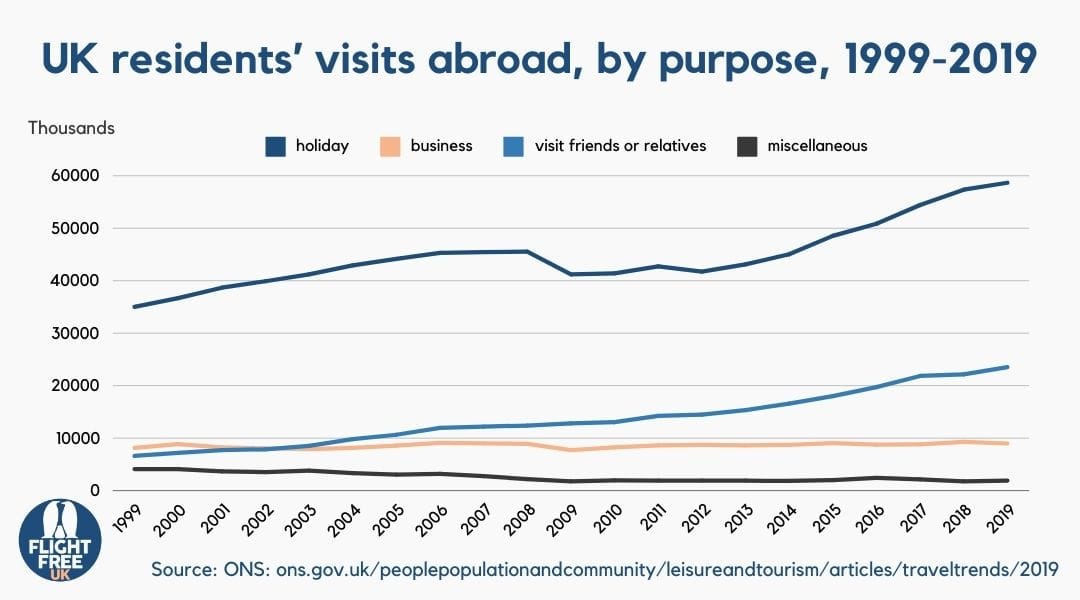A lot of people imagine that there’s a big and growing demand for business flights.
Yet if you look at the stats, business travel in the UK has been pretty much flatlining for a decade, even pre-Covid, and even before the uptick in climate concern.

In the UK, business trips make up about 10% of all visits abroad. The number has only grown slightly since 1999 and actually fell in 2019. Even at Heathrow, which has traditionally been seen as a business hub (and uses growth in business flights as an argument for expansion and a third runway), there are twice as many passengers travelling for leisure as for business, and the growth in air travel and growth in emissions has mostly come from leisure.
So why do we think that business flights are the problem?
Everyone knows someone who flies for business. We compare their frequent trips abroad to our own annual holiday. But actually, people who work in jobs that require air travel make up a very small proportion of the UK population. The holiday market is much, much larger. Still, advertising and other narratives lead us to believe that business flyers are the problem.
Impact of travel choices
Even though, overall, business flights make up a small percentage of journeys, choosing not to fly for work reasons can have a wide-reaching impact – perhaps more so than holiday travel choices. Many businesses would be prepared to fund train travel instead of air travel – it’s just that no one ever asked. If you talk to your employer about different travel options, you might be surprised at the outcome.
The advantage of introducing the concept of low-carbon travel in a workplace is that it will make it easier for others to make the same request, and might even change company travel policy.
Read our inspiring story of Eddie, who chose not to fly for a business trip, which resulted in the company significantly reducing the number of flights they offered.
Reduction of business flights during Covid
At the start of the Covid-19 pandemic, it’s estimated that business travel fell by 70-90%. Many people have the view that, because of the shift to online working during Covid, a lot of business travel is now seen as unnecessary and won't return.
Online working has several benefits: it is logistically easier to bring people together for meetings, especially those who live in different areas. Statistics show that the number of meetings per person increased during the first Covid lockdown, and the number of people attending meetings increased, but the overall meeting time went down, suggesting that online meetings are a more inclusive and time-efficient way to conduct business. Efficiency and inclusivity are major advantages for businesses.
In addition, replacing in-person meetings with online meetings is less expensive, as it eliminates the need for travel, catering and venue hire. Saving money is a big motivating factor for businesses. Reducing travel time and time away from family is good for well-being – another advantage for businesses looking to take care of their staff and create a positive working culture.
Finally, there are big carbon savings when conducting meetings online as opposed to in person, mostly because of the reduction in the amount of travel that’s needed. Many businesses have net-zero targets and want to be seen to be doing the right thing when it comes to the environment. If that can go hand-in-hand with reducing costs, so much the better.
For example, the accountancy firm EY committed to cut its whole company emissions to net zero by 2025, and reduce business travel emissions by 35%. EY has 300,00 employees in over 150 countries, so that’s significant.
Revenue for airlines from business flights
This reduction in business flights might be good for the climate, businesses and their employees, but what about the airlines?
On average, business and first-class tickets are five times the price of an economy seat, and many airlines rely on that revenue in order to offer low prices for the rest of the seats.
Long-haul routes that have premium seats are most likely to suffer. For transatlantic routes, 10% of tickets are for premium seats, and they make up 50% of the revenue. So you don’t need to lose many of those passengers before the profitability of that journey starts to come into question.
There is speculation that if the number of business flights continues to fall, airlines will have to put up prices on other tickets to make those routes profitable.
In the short term, and even in the long term, this could reduce demand for transatlantic travel, as customers who have become accustomed to cheap tickets will no longer be able to afford to travel. We could therefore see an even greater drop in flight bookings.
The future of business travel
This report by McKinsey published in September 2020 predicted that "Business travel will return “at scale” although perhaps never to the levels observed in 2019."
There are certain types of meetings and events that require international travel, for example trade fairs and large-scale conferences, and for those, it’s expected that flights will return.
But for other forms of working, where flights had become habitual rather than essential, the changes seen during the Covid-19 pandemic are likely to stick, given the advantages to staff and businesses. Bill Gates himself said, in November 2020, that half of all business travel would disappear for good as a result of the pandemic. It must be true!
You can also have an impact here. As awareness of the climate crisis grows, more people are requesting virtual speaking slots at conferences, as opposed to being there in person. While some conference organisers show little flexibility on this, others are starting to accommodate remote participation. As more people make the request, the offer will become more common.
With the coming together of the climate crisis and the global health emergency, if there ever was a moment to reset our expectations of business travel, surely it’s now.
Cait Hewitt is Deputy Director at the AEF




